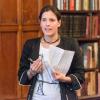I am an assistant professor at the University of Caen, France. I research the history of postwar economics. I was initially interested in how the Great Depression, World War II and the Cold War shaped the intellectual development of Gunnar Myrdal, Jacob Marschak and Milton Friedman. I then studied how economists’ individual visions combine in collective “styles” of doing economics by writing a history of economics at MIT. My current research project (funded by INET) is aimed at understanding the rise of applied economics from the mid-1960s onwards, in particular the transformation of the relationships between theoretical,empirical and policy work in the context of new social demands, computerization, and so forth. I am working on three applied case studies –urban economics, public economics and macro econometric modeling – and one theoretical endeavor – sunspots theory and indeterminacy. To understand the transformation in the structure of economic science, I have also surveyed how economists classify their scientific output through the oft-revised JEL code system.
I’m affiliated with CREM, where I research alongside social choice theorists who debate every local, national or papal election with passion and use three different voting methods to make decisions in hiring committees. This led me to study economists’ interest in collective decision mechanisms (work in progress). I teach in a urban studies department, and I’m therefore experimenting on my students to figure out how to get non-economists interested in the “dismal” science.
I sometimes blog for INET, as well as on my homepage. I post reading suggestions on the history of postwar economics on twitter, and I also rant a bit about the state of French higher-ed, replicability, open-access and other hot potatoes.
